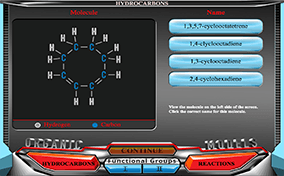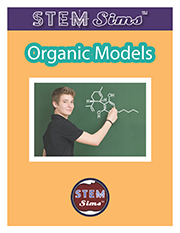What is organic chemistry?
Organic chemistry is the study of carbon-based compounds.
Why is carbon so unique?
Carbon is a relatively unique element since each atom has the ability to make four covalent bonds. Carbon atoms can also be arranged in long chains, branches, ring, and other complex structures. Single, double, and triple bonds can exist between carbon atoms.
What are alkanes?
Alkanes are saturated hydrocarbons in which all of the carbon-carbon bonds in the main group are single bonds.
What are alkenes?
Alkenes are unsaturated hydrocarbons in which at least one of the carbon-carbon bonds in the main group is a double bond.
What are alkynes?
Alkenes are unsaturated hydrocarbons in which at least one of the carbon-carbon bonds in the main group is a triple bond.
What are cyclic compounds?
Cyclic compounds are organic molecules in which one or more carbon atoms are connected to form a ring structure. The smallest organic cyclic compound possible is cyclopropane that has three carbon atoms connected in a ring structure.
What are functional groups?
Functional groups consist of a single atom or groups of atoms bonded to a carbon-containing molecule that gives the molecule special characteristics and properties. A wide variety of important life molecules contain functional groups.
What are amines?
Amines are organic compounds and functional groups that contain at least one nitrogen atom with a lone-non-bonding pair of electrons bonded to a carbon group (R-N). Because of this structure, the nitrogen forms three bonds. R represents a carbon atom or group.
What are aldehydes?
Aldehydes are organic compounds with the functional group R-CHO, where the carbon is double bonded to the oxygen. The carbon is also single bonded to the hydrogen, which makes this group always located at the end of a molecule. R represents a carbon atom or group.
What are alcohols?
Alcohols are organic compounds with the functional group R-OH directly bonded to a carbon atom. The -OH group is also called a "hydroxy or hydroxyl" group. R represents a carbon atom or group.
What are alkyl halides?
Alkyl halides are organic compounds with a halide functional group R-X directly bonded to a carbon atom. The halides (X) are the group 17 members, such as fluorine, chlorine, bromine, and iodine. R represents a carbon atom or group.
What are organic acids?
Organic acids are organic compounds with the functional group -COOH, where the carbon is double bonded to one of the oxygen atoms. The carbon is also single bonded to the other oxygen atom, which in turn is single bonded to the hydrogen atom. Since hydrogen only makes one bond, the acid group is located at the end of a molecule.
What are ethers?
Organic acids are organic compounds with the functional group -R-O-R'-, where the oxygen atom is single bonded to a carbon atom on either of its sides. The carbons on either side of the oxygen atom can be alkyl or aryl groups. R and R' represent the same or different carbon containing groups.
What are esters?
Esters are organic compounds with the functional group -R-(COO)-R'-, where the carbon is double bonded to one of the oxygen atoms. The carbon is also single bonded to the other oxygen atom, which in turn is single bonded to another carbon atom or carbon group. The carbon atom that is double bonded to the oxygen atom must be single bonded to a carbon or carbon group and not to a hydrogen atom. R and R' represent the same or different carbon containing groups.
What are ketones?
Ketones are organic compounds with the functional group -R-(CO)-R'-, where the carbon is double bonded to the oxygen atom. The same or different carbon containing groups (R and R') must be on either side of the carbon with the oxygen atom double bonded.
What are thiols?
Thiols are organic compounds with the functional group -R-S-H, where the carbon is single bonded to the sulfur atom, which is single bonded to a hydrogen atom. The S-H group is also called a mercapto group. R represents a carbon atom or group.
What is a substitution reaction?
A substitution reaction is an organic reaction in which a functional group replaces an atom or other functional group on a molecule.
What is an addition reaction?
An addition reaction is an organic reaction in which one molecule is combined with another molecule that has a double or triple bond to form a new larger molecule.
What is a hydrogen reaction?
A hydrogenation reaction is an organic reaction in which one hydrogen molecule is combined with another molecule that has a double or triple bond to form a new molecule. During this reaction, alkenes are converted to alkanes, or alkynes are converted to alkenes or alkanes. All hydrogenations can also be classified as addition reactions.
What is an elimination reaction?
An elimination reaction is an organic reaction in which one larger molecule loses atoms, resulting in two smaller molecules. An elimination reaction that results in the loss of water is also called a dehydration reaction. Elimination reactions typically happen using mechanisms that occur in one or two steps.
What is a condensation reaction?
A condensation reaction is an organic reaction that combines two or more smaller organic molecules into one larger organic molecule.
What is an esterification reaction?
An esterification reaction is an organic reaction that combines an acid and alcohol to produce an ester. All esterification reactions are also condensation and elimination reactions.
 Organic chemistry has been called the chemistry of life since living organisms consist of and rely on so many organic molecules. The vast number of carbon-based molecules result from the combination of carbon with many other atoms. Your challenge is to identify various organic molecules, functional groups, and basic organic reactions. Get ready, get set, go organic!
Organic chemistry has been called the chemistry of life since living organisms consist of and rely on so many organic molecules. The vast number of carbon-based molecules result from the combination of carbon with many other atoms. Your challenge is to identify various organic molecules, functional groups, and basic organic reactions. Get ready, get set, go organic!

